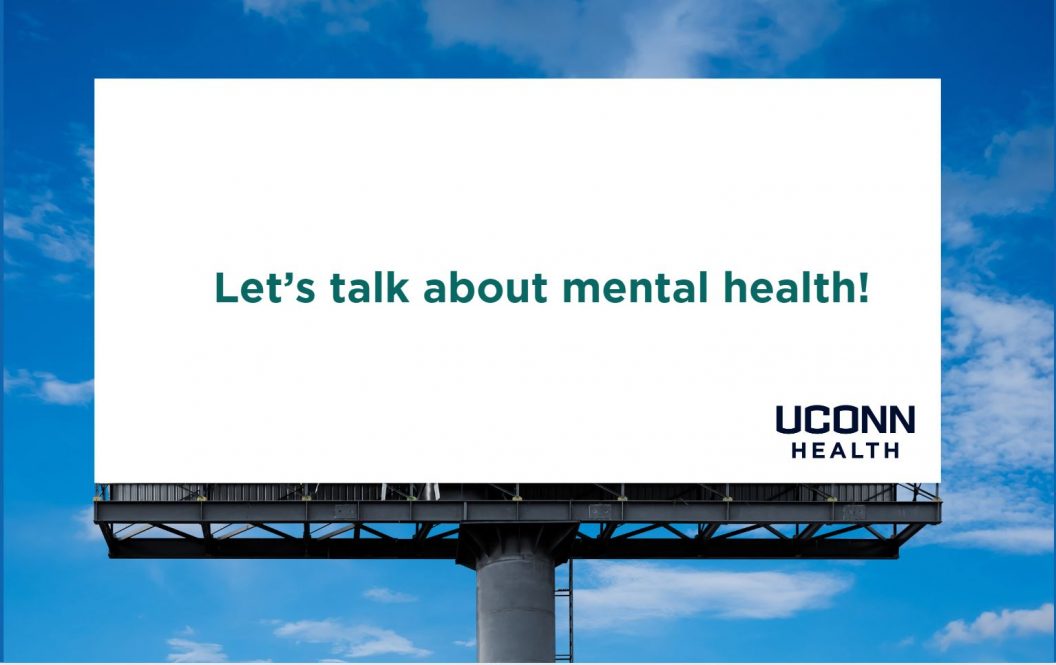Did you know that 1 in 5 of us in the U.S. currently struggle with a mental health condition, ranging from anxiety to depression, with 1 in 20 actually experiencing serious mental illness, such as severe depression, psychosis, or bipolar disorder?
“If you are struggling with a mental health condition that is impacting your thinking, feeling, behavior or mood, whether at work or at home, we want to make sure that you know that you are not alone,” says Dr. David Steffens, chair of Psychiatry at UConn Health. “We also want to remind everyone that we have effective, personalized treatments, including both therapy and medication management options, available to help care for you and make you feel better so you can live a fuller, happier life.”
This October 10 marks World Mental Health Day, with this year’s focus on the importance of mental health in the workplace where you spend a big part of your day and life.
For example, UConn Health is home to nearly 5,000 employees many of whom are health care providers. We have a growing Department of Psychiatry led by Steffens, with inpatient and multiple outpatient services, including the Mood and Anxiety Clinic, directed by Dr. Neha Jain.
“Rates of anxiety and depression have been increasing in Connecticut and beyond since the pandemic. While this is a place providing health care to patients from across the state, our academic medicine workforce at UConn Health needs nurturing as well. Health care providers have to take care of themselves so that they can successfully take care of others,” says Jain. “The Mood and Anxiety Clinic provides 30 percent of our services to our own employees and family members. There should be no stigma attached to getting the mental health services you need.”
Jain also says that we all have a responsibility to make our work meaningful.
“Think about how much time you spend at work. Your work life needs to be meaningful and bring you joy. If work is constantly stressful, no amount of outside coping skills with help you solve the problem,” she says.
If you are struggling or overwhelmed at your workplace, and you think it is impacting your mental health, Jain recommends as a first step that you stop to acknowledge there is an actual issue, remind yourself that you are human, and that your feelings are valid.
As a second step, ask for support, including from peers, and seek mental health services.
Also, find what gives you a greater sense of purpose both at work and outside of work and build upon that. Support your peers if you are able to do that.
Jain also reminds us, “Our work should bring us a sense of accomplishment. We should be able to enjoy our life outside of work. It’s good to be able to find time for yourself, doing whatever helps nourish you, whether it’s a daily nature walk or reading a book on the couch.”
She says, “It’s not always about doing more, but finding balance in your life to help sustain you and to improve your mental health.”
Given how common mental health struggles are in the U.S., Jain has a number one goal.
“Let’s talk about mental health,” she says. “We need to raise awareness of mental health’s importance in our country and our workplaces. We need to normalize talking about mental health and destigmatize seeking care services. Mental illness is a disease just like any other disease and can be managed and treated.”
Jain really enjoys her work as an associate professor of Psychiatry and medical director of the Mood and Anxiety Clinic at UConn Health.
“I love my work. At the end of the day, I go back home knowing I helped someone. Now, I want to help further increase access to mental health care for our communities, including our own UConn Health community.”
If you are ever struggling with severe depression or suicidal thoughts, UConn Health and its psychiatry experts urge you to alert your psychiatric provider immediately. If you do not have a provider, get help by calling: 9-1-1, 2-1-1, or the national Suicide & Crisis Hotline 988, or please visit your nearest Emergency Department where health care providers are always standing by to help you stay safe.



